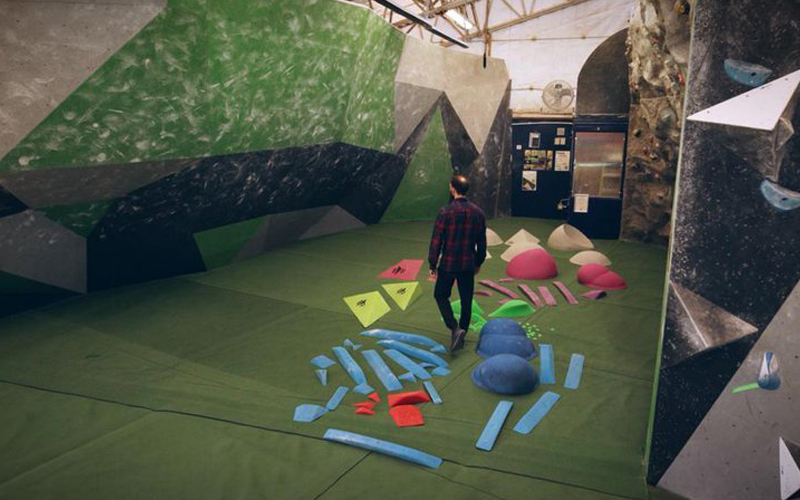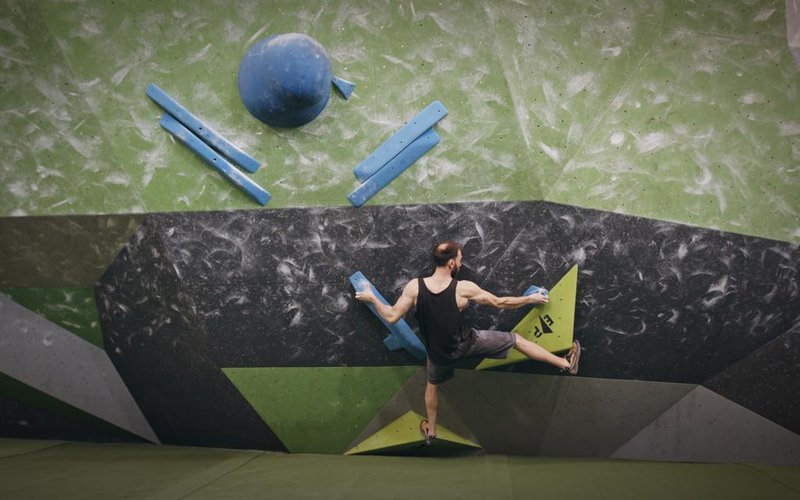CLIMBING INTO THE OLYMPICS – TOKYO 2020


It is an historic day today, as we see climbing make its debut in the Olympics at Tokyo 2020. Who better to give us the inside track on the discipline than route setter and climber Alexander Lemel, patient and friend of The Lewin Sports Injury Clinic.
Usually climbing competitions are split into three separate disciplines:
- Bouldering; the competitors solve complex problems on a 4.5 metre wall with no ropes or protection attached, with the aim to get to the top in the least amount of tries.
- Sport Climbing; the competitors are attached to a rope and have to climb a 15 metre high wall. The aim here is to get to the top (or as high as possible) within a set time limit.
- Speed climbing; two climbers battle each other to see who can get to the top of a 15 metre wall the quickest.
However, climbing in Tokyo 2020 will be a different concept, with the climbers competing in a combined event of all three disciplines in a single day event. They will start with Speed, then move to Boulder, then finish with Lead.
This has created its own set of challenges for the athletes, they have had to learn new disciplines and adapt to new types of training. For example, some competitors may already compete in Boulder and Lead so would have a good level of strength and endurance, but may have not trained in the Speed element before.
As a contrast, an athlete who is a Speed specialist would have to develop the strength and endurance needed for the other two disciplines. This will undoubtedly pose some challenges for the route setters who will need to set the boulders and routes that the athletes climb on, because they will need to take into consideration the different skill sets possessed by the different climbers
When it comes to the individual disciplines ,the route setters will have to set three boulder problems for the men and three for the women along with one lead route for the men and one for the women.
The Speed route is a set route that doesn’t change and is the same the world over, allowing the climbers to practise getting their time as quick as possible.
The men’s Qualifiers are today and women’s tomorrow, with the athletes that make it through doing it all over again on Thursday 5th and Friday 6th in the respective Finals.
The scoring system is quite complex with the climbers scoring a multiplication of their placement in each discipline. The climber with the lowest overall score wins Gold. There are 40 climbers competing – 20 men and 20 women (only two men and two women per country) with these climbers selected from a series of selection events over the past two years.
Representing Team GB will be Shauna Coxsey who qualified at the IFSC World Championship selection event in Hachioji, Japan back in 2019. Shauna has podiumed at 30 World Cups and taken home 11 Gold medals, which goes to show the elite level required to qualify and compete at Tokyo 2020.
I had the opportunity to visit the replica Tokyo 2020 bouldering wall which has been built in Sheffield to assist Shauna in her preparations for the Olympics and set some boulder problems for her to train on. Setting for a world champion and Olympian can be quite a daunting prospect so I can only imagine the pressure the route setters in Japan will have been under to get the level right. They have a very tough job to not only split the climbers so that there is a clear winner, but also put on a great show for everyone watching. This is a pivotal moment in our sport with all eyes on an new Olympic discipline.
Setting for these athletes requires the setters to be operating at pretty much the same level as the athletes themselves and also requires a wealth of experience and knowledge to test the athletes. injuries are common occurrence and, as the climbers have had to adapt to training new disciplines and with an increased volume in training, the inevitable can happen. Finger injuries are usually the most common and, like most injuries, can occur from a single event or a build-up of repetitive stress. Shoulder and knee problems are just as common due to the high forces put through them.
Many of the athletes will probably come into the Games carrying some sort of injury, but how they manage these will be crucial to their success.
Good luck to all the athletes competing, we can’t wait to watch climbing make its debut!
Thanks to Band of Birds for the imagery and Entre-Prises Climbing Walls for creating the wall.
For some more insight into the life of a route setter, you can take a look at this video created by team BMC.
ADDRESSING YOUR INJURY NIGGLES AND GETTING THEM CHECKED
“Oh it’s nothing, just a niggle!” you call, as you head, grimacing, out the door for a run. After all, you feel more or less fine in yourself and it’s nothing a warm bath won’t sort out when you get home. We don’t like to complain and, especially if we’re competitive...
ANKLE INJURIES – HOW TO DIAGNOSE ONE, HOW TO GET BETTER AND HOW TO PREVENT ONE
Ankle injuries can range in severity from full fracture to mild sprain. Unfortunately even a mildly sprained ankle can be extremely painful and this can make it difficult to determine how serious your injury is and how best to treat it. However, most ankle injuries...
INSIDE THE LIFE OF A GREAT BRITAIN INTERNATIONAL AND WTA TENNIS PLAYER, BY ANNA POPESCU
On International Women's Day 2021 we are delighted to share our latest blog, written by Great Britain International and WTA tour tennis player Anna Popescu. Anna travels the world representing the nation at the highest level of her sport, and has been working with...
HOW SPORTING PUPILS ARE NURTURED AT FOREST SCHOOL, BY BEN ADAMS
In our latest blog, we are delighted to hear from Ben Adams, Director of Sport at Snaresbrook's Forest School. The day school, located on the edge of Epping Forest, enjoys a partnership with The Lewin Clinic which helps students receive the quickest assessment and...
HAPPY 1St BIRTHDAY TO US
Celebrating our 1st Birthday The year has gone so quickly, which - considering the challenges we like others have faced - is something of a surprise!We've seen 572 patients who are all involved in a multitude of sports and have needed varying degrees of help from...

Get in touch
020 8070 7777
info@lewinclinic.co.uk
Ground Floor,
65 New North Road
Hainault
Essex
IG6 2UE
Company reg No. - 11731039 (England & Wales)
Reg address:
The Retreat
406 Roding Lane South Woodford Green
Essex IG8 8EY
Opening Times
Monday - Friday 8am - 8pm
Saturday 8am - 1pm



